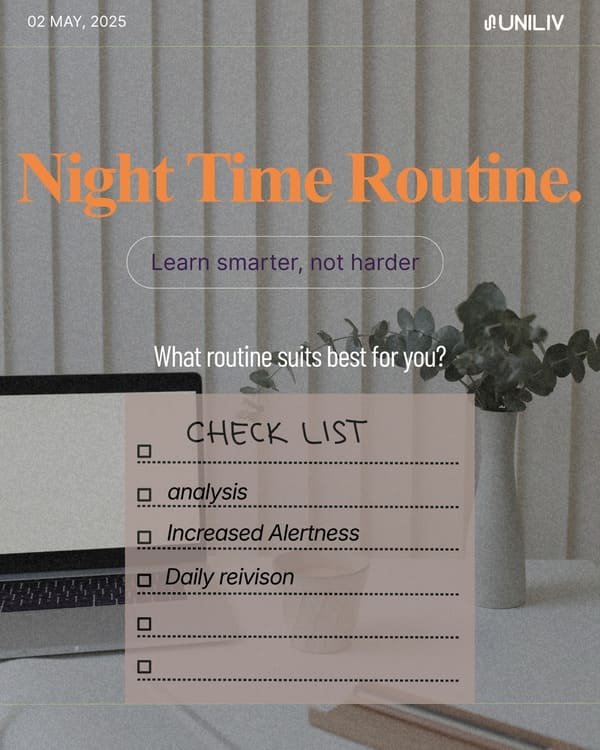What is Best Time to Study – Day or Night

Table of Contents
ToggleAs the quote goes, “The secret to mastery is consistency, whether under sun or moon.” We see many debates about the best time to study—day or night. People often argue that studying at night is preferable due to the quieter environment, or that studying during the day is more effective due to the increased alert nature of the human body. But what they miss is a crucial dimension: the physical environment in which you study has a significant impact on learning, regardless of the time.
Scientific research backs this up. A study in the International Journal of Environmental Research and Public Health found that temperature, noise, and lighting significantly affect students’ learning efficiency and the research showed that temperature, noise level, and lighting always contributed to the best performance in memory and attention tasks. So a good living space plays a very important role in shaping effective study habits. And if you’re a student living in a PG (paying guest accommodation) or any hostel, the best time to study argument becomes more complex: you have very little control over a quiet environment, or how well-ventilated your room and common spaces are, having a well-designed study environment is essential, even in your PG room.
And checking-out PGs like UniLiv – here rooms are designed to provide an optimal environment for students, ensuring a sunlit and ventilated room, with study tables set in the room and common spacious study area which helps in finding the right study routine that starts with understanding your natural energy patterns. Once you know this, you can structure your sessions to align with the best time to study.




6 Technique to find your own Study Routine
With an initial framework in place and some model programs to try, let’s look at some scientifically proven ways to help you find your study time and routine:
Mind Mapping
Organizing information visually helps you see how you think and process ideas and at what time your creative thoughts hit you, observing your study sessions around your natural learning patterns helps you find the best time to study.
Pomodoro Technique
With careful division of your study time into brief and small parts, you can determine how much longer you can successfully focus, which will help you adjust to your everyday routine and the best time to study for yourself.
Feynman Technique
Using simple terms to explain any concepts, it helps you to identify what time of the day helps you understand the material best, thus, creating a routine and time that works as your own best time to study to maximize your understanding.
Spaced Repetition
By knowing when you recall information most easily and more frequently in a day, you can plan your reviews to always be at these times, thereby establishing a memory cycle that is both consistent and best time to study
Active Recall
When you test yourself at various times during the day, it helps you to find out when your memory of the material is the strongest, thus, enabling you to decide which hours are best for concentrated learning.
Time-Blocking
The act of dedicating certain periods to specific subjects or tasks enables you to try out various schedules and eventually find the rhythm that corresponds to your personal energy levels.
You can also check: Best Delhi University (DU) College Festivals
Boost your learning with the best time to study
Is Morning the best time to study? Key Advantages Explained
If you’re a student, figuring out what routine to study. Everyone keeps asking for productivity while you are just confused between your routine, but nobody tells you how to actually do that. That’s where these techniques really help you. Instead of forcing yourself to copy someone else’s timetable, look to the key advantages and find a solution for yourself –
- Boosts productivity for the whole Day: Finishing your study early in the morning sets a positive attitude throughout the day and frees up your mind for other tasks as well.
- Builds Sharper focus and mental Clarity in mind: When your brain is well-rested, you become more sharp minded, making it easier to absorb new information in your brain.
- Improves overall productivity: You become more organized and purposeful, You get more done in less time because your study sessions start early in the morning.
- Reduces stress: Clear structures break big tasks into manageable steps, making studying feel less intimidating.
- Enhances focus and discipline – Morning study routine gives you a system that keeps distractions in check and strengthens concentration over time.
When you observe these and this benefits your study sessions, you are more likely to become a morning study time routine student.
Is Night the best time to study? Key Advantages Explained
Studying at night may be very efficient, and this is particularly true if you are the type of person who becomes more calm after the daily obligations have been taken care of. A calm atmosphere, less interruptions, and a slower pace are some of the reasons why people can often study deeply. Also, night is the time when you can think, study again, and take in new facts as per your own pace, look to the key advantages and find a solution for yourself –
- Naturally calmer environment: As the day winds down, the world gets quieter. This stillness creates a soothing atmosphere where deep thinking and long concentration sessions serve as the best time to study.
- Fewer social interruptions: people around you settle into their own routines and there are less interactions, giving you uninterrupted time to focus without feeling pulled in different directions.
- Boosts Creativity: You get more meaningful, especially creative work done because your efforts are focused and intentional.
- Ideal for long study stretches: At the end of the day there are no upcoming commitments or deadlines during the night hours, you can study at your own pace without watching the clock or feeling rushed.
- Helps build a personal rhythm: Night studying often feels like “your time,” allowing you to tap into a comfortable, personalized rhythm of your own that builds your best time to study.
Conclusion
At the end of the day, the real answer to the “best time to study” debate lies in understanding yourself. Your productivity isn’t constant your memory, alertness, creativity, and critical thinking all peak at different hours. You may find that your visual memory is sharper in the morning, your alertness hits its highest point in the afternoon, or your creativity flows best at night.